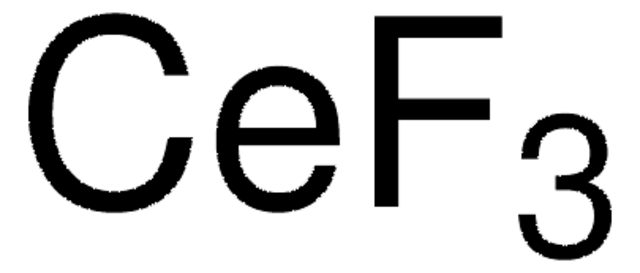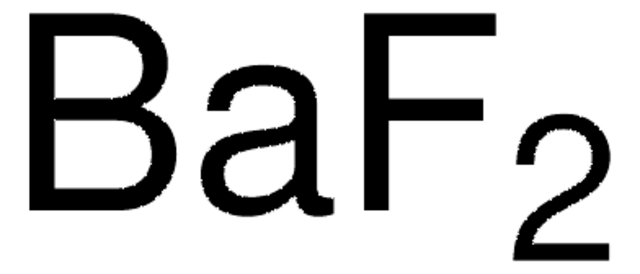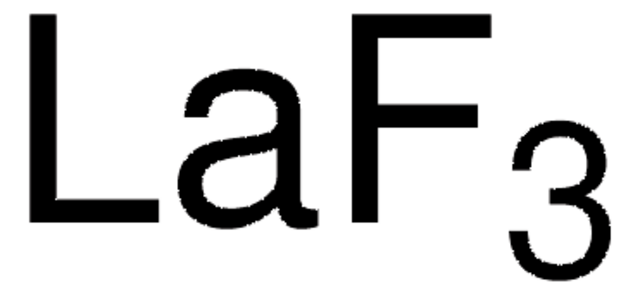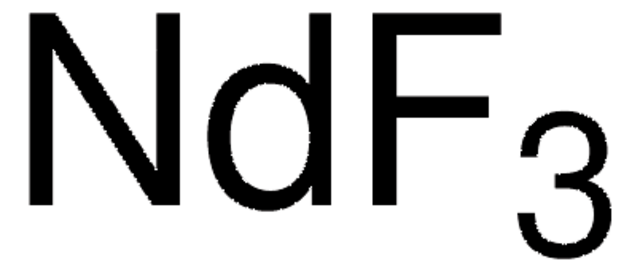450030
Strontium fluoride
anhydrous, powder, 99.9% trace metals basis
Synonym(s):
Strontium difluoride
Sign Into View Organizational & Contract Pricing
All Photos(2)
About This Item
Linear Formula:
SrF2
CAS Number:
Molecular Weight:
125.62
EC Number:
MDL number:
UNSPSC Code:
12352302
PubChem Substance ID:
NACRES:
NA.23
Recommended Products
grade
anhydrous
Quality Level
Assay
99.9% trace metals basis
form
powder
impurities
≤1500.0 ppm Trace Metal Analysis
bp
2489 °C (lit.)
mp
>1400 °C (lit.)
density
4.24 g/mL at 25 °C (lit.)
SMILES string
F[Sr]F
InChI
1S/2FH.Sr/h2*1H;/q;;+2/p-2
InChI key
FVRNDBHWWSPNOM-UHFFFAOYSA-L
Looking for similar products? Visit Product Comparison Guide
Related Categories
General description
Strontium fluoride(SrF2) is a wideband gap anhydrous solid with excellent optical properties. It has a low refractive index, high transmission in the infrared and ultraviolet spectral range, and extremely low solubility in water. It is widely used as a coating material for lenses, optical windows, and prisms.
Application
Strontium fluoride can be used:
- To produce an ultra-thin layer on the ZnO electron transport layer in inverted polymer solar cells. SrF2 thin layer enhances electron extraction efficiency and reduces carrier recombination loss, remarkably improving photovoltaic performance.
- To prepare a highly luminescent Ce3+-doped SrF2 nanophosphor for dye-sensitized solar cells. These nanophosphors help to enhance light harvesting and power conversion efficiencies.
- To fabricate non-toxic and dopant-free electron-selective contact for silicon solar cells. This contact has exceptional stability and thickness tolerance.
Storage Class Code
11 - Combustible Solids
WGK
WGK 2
Flash Point(F)
Not applicable
Flash Point(C)
Not applicable
Personal Protective Equipment
dust mask type N95 (US), Eyeshields, Gloves
Choose from one of the most recent versions:
Already Own This Product?
Find documentation for the products that you have recently purchased in the Document Library.
Strontium fluoride and zinc oxide stacked structure as an interlayer in high-performance inverted polymer solar cells
Shuai Huang, et al.
ACS Applied Materials & Interfaces, 11, 2149-2158 (2018)
Enhanced Power Conversion Efficiency Using a Ce3+: SrF2 Down-Shifting Nanophosphor-Based Photoelectrode for Dye-Sensitized Solar Cell Applications
Arun Kumar Samuel, et al.
ACS Applied Energy Materials, 4, 7112-7121 (2021)
Fabrication and optical property of highly transparent SrF2 ceramic
Weiwei Li, et al.
Materials Letters, 159, 210-212 (2015)
Kan Usuda et al.
Biological trace element research, 167(1), 84-90 (2015-03-10)
Various fluoride compounds are widely used in industry. The present risk assessment study was conducted using a series of inorganic binary fluorides of the type XFn, where X(n) = Na(+), K(+), Li(+), Mg(2+), Ca(2+), Sr(2+), Ba(2+), Al(3+), Nd(3+), La(3+), Ce(3+), Sm(3+), Gd(3+)
Bikramjit Basu et al.
Journal of biomedical materials research. Part B, Applied biomaterials, 103(6), 1168-1179 (2014-10-11)
One of the desired properties for any new biomaterial composition is its long-term stability in a suitable animal model and such property cannot be appropriately assessed by performing short-term implantation studies. While hydroxyapatite (HA) or bioglass coated metallic biomaterials are
Articles
Lanthanide ions in spectral conversion enhance solar cell efficiency via photon conversion.
Our team of scientists has experience in all areas of research including Life Science, Material Science, Chemical Synthesis, Chromatography, Analytical and many others.
Contact Technical Service








